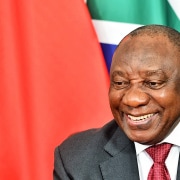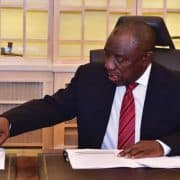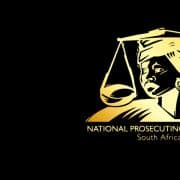|
Getting your Trinity Audio player ready...
|
• The nominated deputy public protector Advocate Kholeka Gcaleka. Image: Mail and Guardian.
By Thato Mahlangu
The Presidency announced on Friday that Advocate Kholeka Gcaleka is the new deputy public protector (DPP).
President Cyril Ramaphosa said in a statement the new DPP, who succeeds Advocate Kevin Malunga, will start on 1 February 2020 and will serve a seven-year term. Gcaleka was recommended for the job by the National Assembly.
“President Ramaphosa thanked Advocate Malunga for his contribution in the office of the Public Protector and service to the people of South Africa,” read the statement.
Prior to her appointment as DPP, Gcaleka was a special advisor in the National Treasury and the ministries, of Home Affairs and Public Service and Administration. She had worked as a senior state advocate and was the senior deputy director of public prosecutions in the National Prosecuting Authority.
Gcaleka is an admitted advocate of the High Court of South Africa and a former national chairperson of the Society of State Advocates of South Africa. She is also a member of the Black Lawyers Association.
“President Ramaphosa has wished Advocate Gcaleka well on her new role and is confident she will execute the responsibilities before her with diligence and commitment,” the statement said.
Controversy and questions
Her recommendation had raised some concerns as Gcaleka used to be the legal advisor to former home affairs minister Malusi Gigaba and worked with ANC MP Menzi Simelane, a former national director of public prosecutions.
News24 had reported on Tuesday 26 November 2019 that the ANC nominated Gcaleka for the position despite opposition MPs questioning her integrity and suitability for the job. The article stated that Gcaleka currently works as the legal adviser for Senzo Mchunu, the minister of public service and administration.
EFF MP Mbuyiseni Ndlozi had questioned the fact that Gcaleka continued to work for Gigaba even when the courts found that he lied under oath, and also did not declare she was an ANC Youth League member.
The process
The committee’s media officer Rajaa Azzakani said the committee received 29 nominations or applications but three declined the nomination or withdrew their application.
“Of the remaining 26 candidates, six candidates did not meet the requirements for the position as laid out in the Public Protector Act, and therefore they were not considered,” explained Azzakani.
On 23 October 2019, Azzakani said, the committee shortlisted eight candidates:
- Advocate Shadrack Nkuna
- Advocate Gcaleka
- Buang Jones
- Advocate Moshoeshoe Toba
- Advocate Puleng Matshelo
- Advocate Lwazi Kubukeli
- Advocate Noxolo Mbangeni
- Advocate Sonwabile Mancotywa.
“Once shortlisting took place, all candidates were requested to complete a questionnaire, based broadly on the one that the Judicial Services Commission makes use of in the case of judicial appointments. The questionnaire also contained provisions for disclosure,” Azzakani said.
Vetting of candidates
She further explained that the committee agreed that the shortlisted candidates be subjected to security screening and that their academic qualifications be verified.
“Parliament was asked to facilitate the security screening of the candidates, while its human resources division undertook the verification of the academic qualifications,” explained Azzakani.
This then led to Mancotywa notifying the committee about his intentions to withdraw from the process. The committee’s secretary Vhonani Ramaano said his withdrawal had nothing to do with the verification of his qualifications.
“He did not provide reasons for his withdrawal,” Ramaano said.
According to the committee, before shortlisting commenced, the committee published the names of all candidates with their accompanying CVs on Parliament’s website after redacting certain personal details.
Public participation
“Members of the public were given an opportunity to make submissions on the candidates,” the committee said in a statement.
Committee Chairperson’s Bulelani Magwanishe said the committee welcomes the considerable public interest that its work has attracted.
“The committee agreed to facilitate public participation in order for the process to be open and transparent. We are therefore indebted to members of the public for their contribution to this process in order for us to be able to make this nomination to the National Assembly,” he said.
Our involvement
Corruption Watch made a submission to Parliament on 16 October 2019 with the aim of contributing to the appointment of the next DPP. We ran the Bua Mzansi – Deputy Public Protector Campaign to ensure that the appointment took place transparently and allowed for public participation and public influence.
Members of the public could review the CVs of candidates – an important step in the process of influencing the calibre of leaders appointed to key institutions.
Since 2016, Corruption Watch has been campaigning around the appointment processes of leaders to key crime and corruption fighting institutions in South Africa. Our main objective is to ensure that candidates are appointed in a transparent manner, assessed against clear merit-based and objective criteria and that avenues for public participation in appointment processes are made available.
Our submission
Corruption Watch’s submission noted several controversies surrounding Gcaleka. In 2010 Gcaleka, who was the chairperson of the Society of Advocates at the time, was quoted as saying there should be no concern around Simelane’s plan for restructuring the criminal justice system, which included proposals to close the specialised commercial crime unit and asset forfeiture unit.
In 2017, allegations emerged that Gcaleka had tried to coerce a witness, during the Richard Mdluli murder trial in 2011, into implicating the accused, and that the prosecution team tampered with evidence.
Also in 2017, senior treasury officials alleged that Gcaleka, who was an advisor to the finance minister at the time, was part of a network attempting to ‘capture’ National Treasury.








